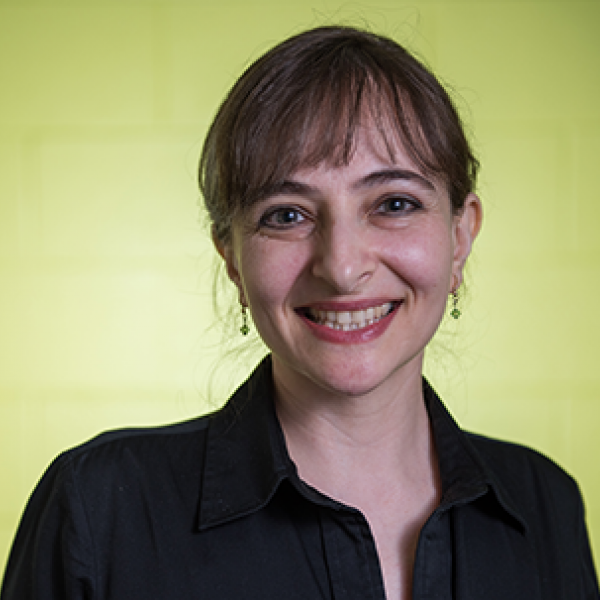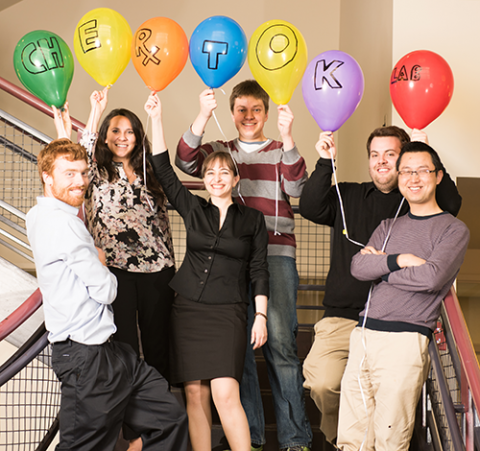Dr. Beata Chertok Gains Acclaim and Grant for Research Work

Beata Chertok, PhD, Assistant Professor of Pharmaceutical Sciences, Assistant Professor of Biomedical Engineering, has received an exclusive seed grant in support of her research and the honor of being first author on a highly cited paper.
Dr. Chertok’s work was recognized with the Fay Frank 2015 Seed Grant from the Brain Research Foundation (BRF). Dr. Chertok was selected to receive this award as one of only 11 scientists from 29 US institutions invited by the foundation. The objective of the BRF Seed Grant Program is to support new and innovative projects, especially those of junior faculty who are working in new research directions in the field of neuroscience. The funding will support Dr. Chertok’s mission to develop tiny devices the size of blood cells that can be injected into the blood stream and non-invasively activated in specific locations of the brain to release molecules with pre-programmed timing. Dr. Chertok envisions using these devices to modulate responses of the immune system in the brain. “In the normal brain, the immune system efficiently fights infections. But in many brain diseases including Alzheimer’s, traumatic brain injury, and cancer the immune system acts in reverse – it stimulates the disease instead of fighting it. We hope to develop tiny non-invasive tools that would allow re-programming of immune responses in the brain. These tools could pave the way for design of safe and effective therapies for a broad range of brain diseases,” she explains. “I’m honored that such a prominent neuroscience foundation as BRF recognizes the potential of my research and thrilled to be able to initiate a project that could lead to better therapies for people afflicted with brain diseases,” says Dr. Chertok.


Dr. Chertok has a record for bringing her innovative ideas to fruition. A paper she first-authored as a part of another project “Iron oxide nanoparticles as a drug delivery vehicle for MRI monitored magnetic targeting of brain tumors” (Chertok B. et al., Biomaterials, 29(4):487-496, 2008) received enough citations to place it in the top 1% of its academic field based on a highly cited threshold for the field and publication year. The study explored the possibility of utilizing iron oxide nanoparticles as a drug delivery vehicle for minimally invasive, MRI-monitored magnetic targeting of brain tumors. Dr. Chertok and co-authors, including senior author, Dr. Victor C. Yang, Albert B. Prescott Professor of Pharmaceutics, demonstrated that accumulation of iron oxide nanoparticles in gliosarcomas can be significantly enhanced by magnetic targeting and successfully quantified by non-invasive MR imaging. This research is on the cusp of the field of theranostics. Theranostics are materials that integrate diagnostic and therapeutic capabilities. Dr. Chertok’s work has been cited by researchers in a multitude of fields including nanotechnology, materials science, pharmaceutics, biotechnology, medical imaging, and neuro-oncology. “Current drug therapies allow very little control over what happens to the drug after it enters into the body. The result is inadequate therapeutic action, a plethora of side effects, and poor fit with the needs of an individual patient,” says Dr. Chertok. “The intersection of drug delivery and medical imaging through development of theranostic carrier systems offers an exciting opportunity to change that and design safer, more effective, and personalized therapies. I’m honored that other scientists find our contribution in this domain useful for their work,” she adds.


Dr. Chertok’s interdisciplinary focus allows her to blend concepts of pharmaceutical sciences, biomedical engineering, medical imaging as well as drug/gene delivery and nanotechnology; the products of which are gaining national recognition. The University of Michigan College of Pharmacy is proud to provide an environment where innovative and cross-disciplinary research can blossom into results.



